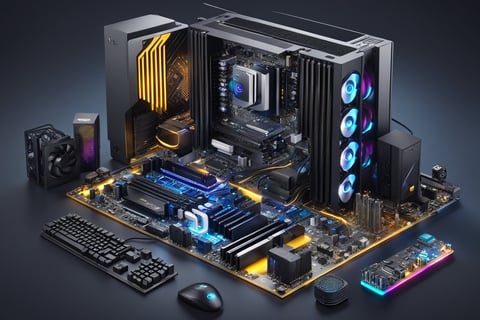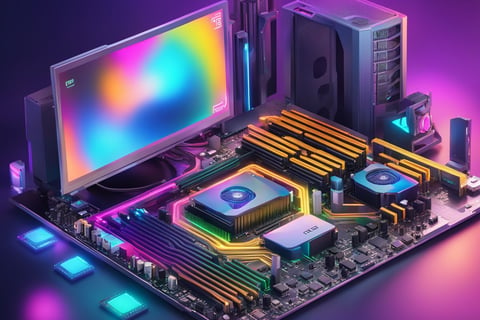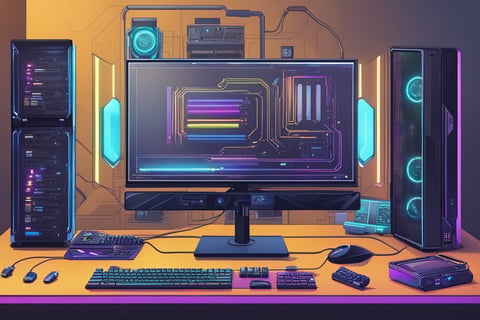Best Budget CPUs for Gaming
5/8/20245 min read
Finding a powerful CPU on a budget can significantly enhance a gaming experience without breaking the bank. Many gamers often overlook the importance of a good processor, focusing solely on graphics cards. The right budget CPU can provide excellent performance and meet the demands of most games today.
As technology progresses, several affordable options offer impressive capabilities, ensuring that players get value for their investment. This guide will highlight the best budget CPUs available, helping gamers make informed choices tailored to their needs.
With an increasing number of titles requiring more processing power, it’s essential to choose wisely. By exploring various options, gamers can maximize performance while staying within budget constraints.
Understanding CPU Performance in Gaming
CPU performance in gaming is influenced by several key factors. These include clock speed, core count, and architecture efficiency.
Clock Speed: Measured in GHz, higher clock speeds can improve performance. Modern games often benefit from faster cores, making clock speed an important factor.
Core Count: Many games utilize multiple cores. A CPU with more cores can handle multitasking and complex calculations better. For gaming, 4 to 6 cores are typically sufficient for most titles.
Architecture Efficiency: CPU architecture impacts how efficiently instructions are executed. Newer architectures often provide better performance per clock cycle.
Cache Size: A larger cache allows for quicker data retrieval. This reduces latency and enhances game performance.
Integrated Graphics: For budget systems, a CPU with integrated graphics can save costs. It allows gaming without a dedicated GPU, suitable for lower-demand titles.
Thermal Design Power (TDP): TDP indicates how much heat a CPU generates. A lower TDP can lead to quieter and more efficient cooling solutions.
Key Takeaways
Priority on Core Count vs. Clock Speed: Depending on the game type, the preference may shift.
Balance Between CPU and GPU: Both components should work well together to avoid bottlenecks.
Selecting the right CPU involves understanding these factors to ensure optimal gaming performance within budget constraints.
Top Budget CPUs on the Market
This section highlights top budget CPUs that deliver excellent gaming performance at an affordable price. Attention is given to entry-level picks, mid-range options, and those that provide the best value for performance.
Entry-Level Picks
For gamers on a tight budget, entry-level CPUs like the AMD Athlon 3000G and Intel Core i3-12100 are solid choices. The Athlon 3000G offers integrated graphics, making it ideal for less demanding games without a dedicated GPU. With a dual-core design, it runs games smoothly at lower settings.
The Intel Core i3-12100, a solid quad-core processor, shines with its excellent single-threaded performance. Featuring Intel's UHD integrated graphics, it supports a range of gaming titles while maintaining low power consumption. Both options cater to entry-level gamers looking to maximize performance without overspending.
Mid-Range Options
Moving up in budget, the AMD Ryzen 5 5600G and Intel Core i5-12400 are strong contenders in the mid-range category. The Ryzen 5 5600G features six cores and twelve threads, providing ample multitasking capabilities for gaming and streaming. Its integrated Radeon graphics perform admirably in several titles, making it a versatile choice.
Meanwhile, the Intel Core i5-12400 stands out with its impressive performance in gaming and productivity tasks. Its six cores excel in handling demanding applications, and it supports the latest DDR4 memory. This CPU balances cost and performance, suitable for gamers seeking both value and capability.
Best Value-to-Performance Ratio
For the best value-to-performance ratio, the AMD Ryzen 5 5500 and Intel Core i5-13400 come highly recommended. The Ryzen 5 5500 provides six cores and is optimized for gaming, offering outstanding performance at a competitive price. Its architecture allows for effective cooling and energy efficiency.
The Intel Core i5-13400 is another value champion. Boasting hybrid architecture with both performance and efficiency cores, it excels in gaming while maintaining flexibility for various workloads. Its price point is attractive, offering gamers an effective blend of performance and cost-efficiency for gaming setups.
Factors to Consider When Choosing a CPU
Selecting the right CPU involves evaluating several key factors. Understanding clock speed, core count, compatibility, overclocking potential, and thermal design power will ensure informed decisions.
Clock Speed and Core Count
Clock speed, measured in gigahertz (GHz), indicates how many cycles a CPU can perform per second. Higher speeds generally translate to better performance, especially in single-threaded applications. Core count plays a crucial role in multitasking and parallel processing.
For gaming, a balance between clock speed and core count is essential. Many modern games benefit from multiple cores, but some might still favor higher clock speeds. A quad-core or hexacore CPU can typically handle current gaming demands effectively.
Compatibility With Other Hardware
Compatibility is vital when choosing a CPU. The CPU must match the motherboard’s socket type, identified by specific letters and numbers (e.g., LGA 1200, AM4). Selecting a compatible chipset also ensures the CPU can utilize all features, including overclocking.
Other components, like RAM and cooling systems, should also match the CPU specifications. Ensuring compatibility prevents bottlenecks and optimizes performance. Before purchasing, verifying compatibility using manufacturer websites or compatibility tools can save time and cost.
Overclocking Potential
Overclocking allows users to increase a CPU's performance beyond factory settings. Not all CPUs support this feature; typically, models designated with a “K” or “X” allow for adjustments. Overclocking can lead to significant performance gains in gaming and demanding tasks.
However, overclocking requires adequate cooling and a suitable motherboard. Users should understand the risks involved, such as increased heat generation, which could affect longevity. A strong cooling solution is necessary to manage temperatures effectively.
Thermal Design Power (TDP)
Thermal Design Power (TDP) indicates the amount of heat a CPU generates under maximum load. TDP is measured in watts (W) and can influence the cooling solutions required and overall system build considerations.
A CPU with a higher TDP typically requires better cooling solutions, impacting cost and build complexity. Lower TDP CPUs are ideal for compact builds and can lead to quieter systems. Additionally, TDP influences power consumption, which is an important consideration for budget-conscious consumers.
How to Maximize CPU Gaming Performance
To enhance CPU gaming performance, several strategies can be employed.
1. Optimize Game Settings
Lowering graphics settings can reduce the workload on the CPU.
Adjust resolution, texture quality, and shadow details for better frame rates.
2. Keep Software Up to Date
Update drivers regularly, particularly for the graphics card and chipsets.
This can lead to better performance and compatibility with the latest games.
3. Monitor Background Processes
Close unnecessary applications running in the background.
This frees up CPU resources, allowing more power for gaming.
4. Adjust Power Settings
Switch the power plan to High Performance in the system settings.
This gives the CPU access to more power for demanding tasks.
5. Overclocking
If the CPU supports it, consider mild overclocking.
Care should be taken to monitor temperatures to prevent overheating.
6. Upgrade Cooling Solutions
Improving the cooling system can help maintain optimal performance.
Effective cooling ensures the CPU operates at maximum efficiency.
7. Regular Maintenance
Periodic cleanups and defragmentation of the hard drive can help.
This keeps the system running smoothly, enhancing overall gaming performance.
Utilizing these methods can significantly improve the gaming experience by ensuring the CPU operates at peak efficiency.










